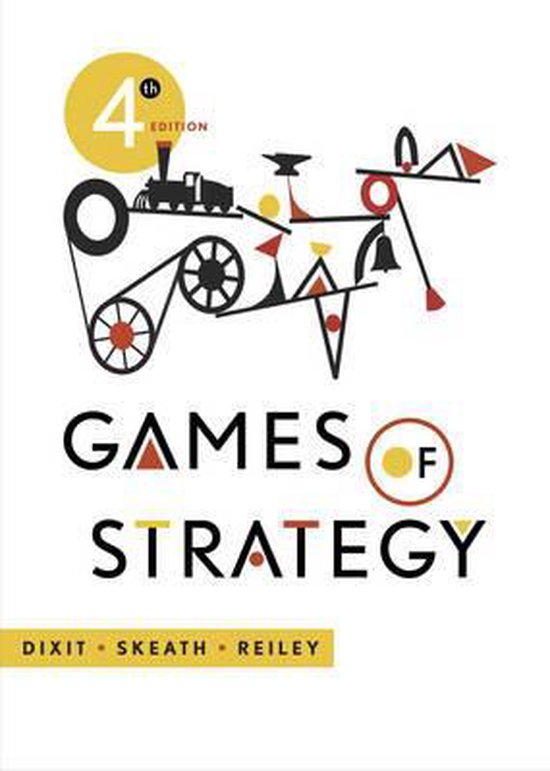Chapter 2. How to Think about Strategic Games
1. Decisions versus games
When a person decides how to act in dealings w other people, there must be some cross-
effect of their actions
Cross-effect
o What one does must affect the outcome for the other
For an interaction to become a strategic game, we need something more
o The participants need to be mutually aware of the cross-effect
This distinction is captured by distinguishing btwn strategic games and decisions
o Strategic games: interactions btwn mutually aware players
Or sometimes just games bc we do not look at other types of games
o Decisions: action situations where each person can choose without concern for
reaction or response from others
The simple rule is that unless there are two or more players, each of whom responds to
what others do, it is not a game
Strategic games arise most prominently in head-to-head confrontations of two
participants
o In contrast, interactions among a large number of participants seem less susceptible to
the issues raised by mutual awareness
In fact, game theory has a much greater scope
o Many situations that start put as impersonal markets turn into strategic interactions
o This happens for two broad classes of reasons
1. Mutual commitments
2. Private information
To sum up
o when each participant is significant in the interaction, either bc each is a large player to
start with or bc commitments or private info narrow the scope of the relationship to a
point where each is on important player within the relationship, we must think of the
interaction as a strategic game
o such situations are the rule rather than the exception in business, in politics and even in
social interactions
o therefore, the study of strategic games forms an important part of all fields that analyze
these matters
2. Classifying games
,A. Are the moves in the game sequential or simultaneous?
Most actual games combine both simultaneous and sequential moves
The distinction btwn sequential and simultaneous moves is important bc the two types
of games require different types of interactive thinking
o In a sequential-move game
each player must think: If I do this, how will my opponent react?
Your current move is governed by your calculation of its future consequences
You must look ahead to act now
o In a simultaneous move game
You have to figure out what your opponent is going to do right now
You must square the circle of “He thinks that I think that he thinks… “
The study of sequential games also tells us when it is an advantage to move first and
when it is an advantage to move second
o Roughly speaking, this depends on the relative importance of commitment and
flexibility in the game in question
B. Are the players’ interests in total conflict or is there some
commonality?
Zero-sum games
o When one player’s gain is the other’s loss
o More generally, the idea is that the players’ interests are in complete conflict
o Such conflict arises when players are dividing up any fixed amount of possible gain
o Bc the available need not always be exactly 0, this is also called a constant sum game
Most economic and social games are not zero sum, neither are wars or strikes
o A nuclear war is the most striking ex of a situation where there can only be losers, but
the concept is far older Pyrrhus in 280 B.C
Most games in reality have this tension btwn conflict and cooperation
C. Is the game played once or repeatedly, and with the same or
changing opponents?
Actions in one-shot games are more likely to be unscrupulous or ruthless
o Bc the players need not worry about repercussions
In one-shot games, secrecy or surprise is likely to be an important component of good
strategy
More generally, a game may be zero-sum in the short run but have scope for mutual
benefit in the long run
,D. Do the players have full or equal information?
In chess, each player knows exactly the current situation and all the moves that led to it,
and each knows that the other aims to win
o This situation is exceptional
In most games, the players face some limitation of information. Such limitations come in
2 kinds
o 1. External uncertainty
o 2. Strategic uncertainty
1. External uncertainty
o A player may not know all the information that is pertinent for the choice that he has to
make at every point in the game
2. Strategic uncertainty
o A player may be uncertain about exactly what moves his opponent has made in the
past or is making at the same time he makes his own move
Perfect information
o = if a games has neither external nor strategic uncertainty
Imperfect information
o = if it has either external or strategic uncertainty or both
Asymmetric information
o = when one player knows more than another does
o Incomplete info
o Players’ attempts to infer, conceal or sometimes convey their private info become an
important part of the game and the strategies
The general principle here is that you want to release info selectively
o You want to reveal the good info and conceal the bad
o This raises a problem
Your opponents in a strategic game are purposive, rational players, and they know
that you are too
Therefore, you are not going to accept your unsupported declarations about your
progress or capabilities
They can be convinced only by objective evidence or by actions that are credible proof
of your information
Such actions that are credible proof of your information are called signals, and strategies
that use them are called signaling
The less informed party can create situation in which the more-informed player will have
to take some action that credibly reveals his information
o Such strategies are called screening
, o And the methods they use are called screening devices
E. Are the rules of the game fixed or manipulable?
In chess, sports, card games, the rules are given, and every player must follow them
But in games of business, politics and ordinary life, the players can make their own rules
to a greater or a lesser extent
o In such situations, the real game is the pregame where rules are made, and your
strategic skill must be deployed at that point
Players may also be unsure of their rivals’ abilities
o This often makes the pregame one of asymmetric info requiring more subtle strategies
and occasionally resulting in some big surprises
F. Are agreements to cooperate enforceable?
Most strategic interactions consist of a mixture of conflict and common interest
o Then there is a case to be made that all participants should get together and reach an
agreement about what everyone should do, balancing their mutual interest in
maximizing the total benefit and their conflicting interest in the division of gains
o However, even after the completion of such a process, additional difficulties often arise
in putting the final agreement into practice
Agreements to cooperate can succeed if all players act immediately and in the presence
of the whole group, but agreements w such immediate implementation are quite rare
o However, in many other instances individual actions are neither directly observable nor
enforceable by external forces
Cooperative games
o Games in which joint-action agreements are enforceable
Noncooperative games
o Games in which enforcement of joint action agreements is not possible and individual
participation must be allowed to act in their own interests
The important distinction is that in so-called non cooperative games, cooperation will
emerge only if it is in the participants’ separate and individual interests to continue to
take the prescribed actions
The terms cooperative and noncooperative refer to the way in which actions are
implemented or enforced and not to the the nature of the outcomes
Most games in practice do not have adequate mechanisms for external enforcement of
joint-action agreements
o Therefore, most of our analytical discussion will deal w the noncooperative mode












